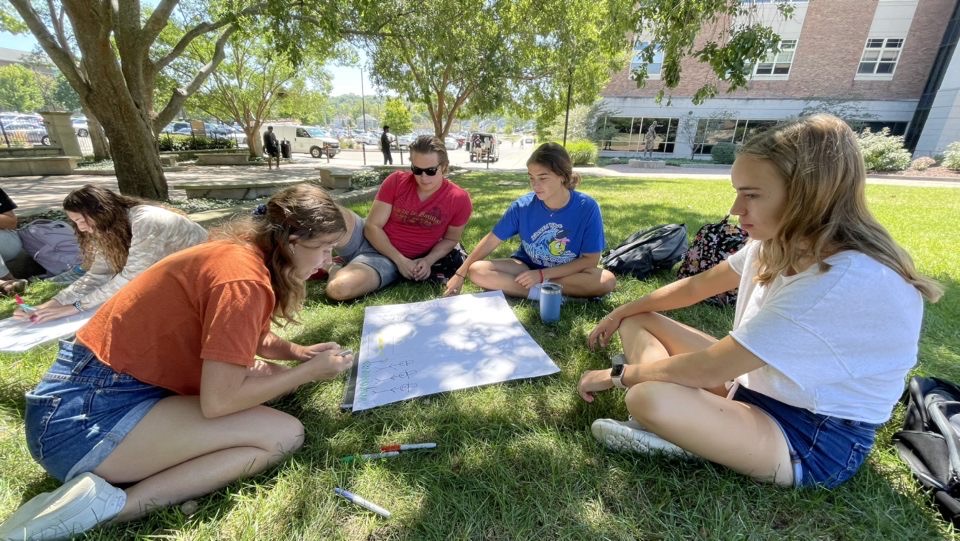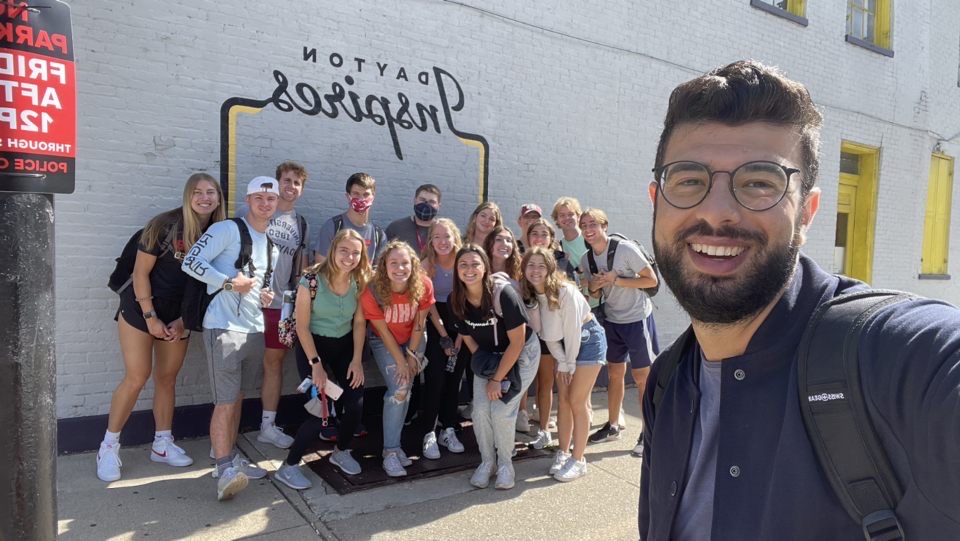University Honors Program

The Deep Dive of Honors Courses
By Katherine Hoener
From the outside, the Honors Program, whose goal is to encourage social responsibility and ethical sensitivity through leadership and service opportunities, may appear overwhelming. For instance, to maintain membership students must earn a certain number of Honors credits throughout their academic careers. Nonetheless, it is a wonderful opportunity for both students and professors to explore ideas, beliefs, and passions within the curriculum of an Honors course.
Youssef Farhat is a critical actor of the Political Science department, and coordinator for the Diversity and Social Justice component of the Common Academic Program. However, up until fall 2021, Farhat never tackled teaching an Honors course, nor had I attempted to take one.
Through a discussion between Farhat and myself, a series of questions offered insight into our first time experiences of an Honors course. Overall, it was not difficult to transition to teaching an Honors course as Farhat used the same style of teaching, which centers around discussions and presentations. However, a variety of challenges revealed themselves throughout the semester. For example, it was difficult to cover all of the topics within the social science integrated course, when presented with such intellectual curiosity from the different disciplines of the students. Farhat claims at times it was difficult to ensure students were never overwhelmed, yet still felt enlightened by the topics beyond the bare minimum. Personally, I did not find the course load a difficult factor of the transition. However, discussions dived deeper than the material and it was challenging to not only expand my knowledge by building my own ideas, but to comprehend those presented by my peers as well.
I had the privilege of having Farhat for a political science course a year before our journey into Honors. Therefore, together we were able to recognize differences between an Honors course versus not. Farhat has strongly aligned his courses with the community approach of UD. With that, he has created peer-to-peer assignments, which involve watching videos or listening to podcasts, followed by one-on-one discussions between students. However, in an Honors setting Farhat noted that students already knew each other. Ultimately, this shifted the goal to strengthening rather than developing those relationships. This led to in-depth discussions filled with innovativeness and connections to personal fields of each student. I was able to recognize the change within the discussions facilitated by Farhat in the Honors course. Furthermore, these relationships were evidently strengthened as my peers and I still acknowledge one another through passing around campus.
After completing anything for the first time, it is not unnatural to consider what you may have done differently. Farhat mentioned selecting more challenging podcasts or videos to reflect upon. In addition to this, this semester he plans to experiment with holding the peer-to-peer discussion with two students in the middle and others forming a circle around them.
In doing so, students will be able to hear the ideas of everyone and can engage when and where they see fit. Already having Farhat meant that there was never a day I was not comfortable with the activities. However, if I could do anything differently, at times I would take more of a backseat role within group work, to allow other students to reach the same level of comfortability.
After a full semester of an Honors course, it is important to acknowledge there are benefits. We both agree upon the ability to engage in analytical conversations, the value of community, and that it was full of surprises. Farhat found comfort in knowing that most students were prepared all the time, which drives the environment of a classroom rooted in discussions. Furthermore, the students showcased a level of flexibility that gives freedom to try new things, such as having class outside when the weather is nice. On multiple occasions, we were able to adapt without the fear that the content would not land.
Overall, the main benefit of an Honors course lies within all the relationships involved. Not only was Farhat a mentor for us, in ways we mentored him, and most importantly one another. Farhat described the experience as being co-pilots, where the instructor provides the structure of the course, but responds to feedback from students.
In one word, the experience of teaching and taking an Honors course for the first time can be described as deep: depth in relationships, depth in community, and depth in material. I would recommend not only taking any course possible with Farhat, but that each student should seize the opportunity to take an Honors course as it is both encouraging and inspiring.

Professor Farhat and Class
Photo of Professor Farhat with his first honors class.
Professor Farhat and Class

